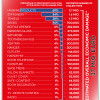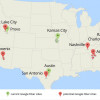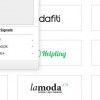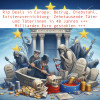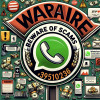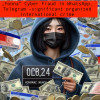
Rocket Internet & Oliver Samwer: Annual loss of 431 million Euros in 10 affiliated companies? / Famous German TV format barrages Olli with lots of unpleasant questions
Driven by the positive media hype of the last few months, Oliver Samwer of Rocket Internet may have thought: I'll channel my inner John Steed and let my brilliance and irony deal with Frontal21, that famous ZDF format. However, only one person was dealt with in the end - multiple times across the table, and not the soft but the hard way: Oliver Samwer. During the tough ZDF interview about Rocket Internet's worldwide dealings, he actually had beads of sweat run down his face:

Whoever advised German Rocket Internet CEO Oliver Samwer to take it up with the German public-service broadcasting company ZDF, especially with the format Frontal21 that critically questions political, economic and social issues: that person didn't do Olli, as many in the scene call him actually rather reverently, very much of a service.
You could almost pity him, seeing Oliver Samwer sitting in his chair in such a boyish-manly manner. But Oliver Samwer is a tough guy who has made many other tough guy, according to rumours in the scene, shed a tear or two. So let's dive into Ollis World and let's recall those scenes in which Oliver Samwer, for once, was the one getting handled the hard way.
The big fat cover story of the German weekly business news magazine 'Wirtschaftswoche' on Monday, August 25, 2014 about the Samwer brothers and Rocket Internet with the rather unflattering headline "Die Glorreichen Halunken" ['The Glorious Scoundrels' with reference to the Itallian Western 'The Good, the Bad and the Ugly'] (Authors: Henryk Hielscher, Karin Finkenzeller, Michael Kroker) already has you think: oh dear, this is going to be the worst press that the Samwers ever had to experience.
Looking at the photographs that had been staged in typical Wirtschaftswoche style where Alexander Samwer, Oliver Samwer and Marc Samwer pose dressed in the fine garments of RED slim-fit shirts (brand: Boss?) and black ties, made us rub our eyes in disbelieve. We were asking ourselves: Did these three follow the reporters voluntarily to their media execution like a lamb to the slaughter? And: who, in God's name, has failed within the company with good advice? Up to now, you hardly ever saw photographs where all three of them pose together. One that kept reappearing in the media was one showing all three Samwer guys at the Outer Alster Lake in Hamburg wearing Jamba t-shirts.
Well, considering the media super storm that's descending upon the Samwers, some people in the German internet scene can hardly suppress a grin. So far, if things were looking black for other internet companies, they'd be massively criticised. Not the Samwers: distinct and charming appearance, attractive and cheeky, Oliver Samwer simply smiled it all away. Just like water off a duck's back, nothing could scratch the Samwer's image of good boys.
And this is the ZDF title in Frontal21: "Die große Samwer Show: Rocket Internet/Die Milliardengeschäfte der Samwer-Boys" ['The big Samwer show: Rocket Internet/The billion Euro business of the Samwer boys'], naming Christian Esser and Birte Meier as authors. Two ZDF journalists that could be seen every now and again during the 45 minute show of 'Grill Oli on his business.'
Olli in the Louvre in Paris - exactly where the Mona Lisa is
We get to know: in the Louvre in Paris, exactly where the Mona Lisa hangs, representatives of the most important business groups met not so long ago. "One of their biggest competitors" was also invited: Oliver Samwer - the personified digital revolution made in Germany. On the ZDF's show, we hear what the internet scene knows: Oliver Samwer, that's the front man of the Samwer brothers.
This was also more or less common knowledge: The Samwer brothers' parents are wealthy. Their father is one of the most well-known lawyers in Cologne - the city that's notorious for cronyism.
The ZDF cuts to the Mitte district of Berlin. This is where the Samwer brothers forge new plans in their headquarters - Rocket Internet. According to the show, most employees are male, less than 30 years old, eager to work around the clock (and, if we're interpreting the latest Samwer book "Die Paten des Internets" by Joel Kaczmarek ['The godfathers of the internet'] correctly, they're eager to have Olli give them a real ticking-off every now and again). Apparently, between 10,000 and 20,000 people are working for Rocket Internet, 350 of them in Berlin.
The ZDF points out that if you're working at Rocket you feel like you're someone special. Oliver Samwer doesn't let anyone get close to his company, says the ZDF. After months, Mr. Samwer is finally ready to give an interview.
This is where the tough boss then says: Rocket, that's a little bit like the German virtues. Always hard at work but also the motto ‘don't make such a big fuss.’ Oliver Samwer writes something similar in his English language final university thesis from 1998 ('America's Most Successful Startups'; WHU Otto Beisheim School of Management Koblenz). Good employees need a good working environment, says Olli as if he was the posh representative from the United Services Trade Union waiting at the coffee machine to the left. According to Oliver Samwer, they are a little bit like Würth - high quality products and excellent service. His aim, says the ZDF, are 150,000 employees.
According to Frontal21, Rocket Internet now wants to take on Ikea with its branch home24. Rocket Internet operates globally - various Netz-Trends.de analyses regarding Rocket prove this. If there's money to earn with something the Samwers won't be far, say the ZDF. Their goal: to become as big as Facebook or Google. At the same time, Rocket is apparently completely different to other German internet companies: They particularly stand out with their practise of strikingly resembling others - other portals that existed before Rocket Internet did. ZDF Frontal 21's conclusion: the Samwers are specialised on cloning.
As an example, the still powerful public broadcaster names Alando. As many might know, this is the first Samwer project dating back to 1999. For the ZDF, this is an eBay clone. Samwer's next strike was Jamba. The ZDF recalls: the Samwer brothers put a lot of money into TV advertising for Jamba. The result: after 9 months, the well-known Samwer ring tone provider already had more than one million subscribers. With many children among them. This netted the Samwer brothers a ton of complaints and lawsuits.
Olli's voice: somewhere between a tough military officer and entertainment boss in Florida
Suddenly, Jamba was sold for the enormous amount of 273 million Dollars. Oliver Samwer adopts business models that have already proven successful, the ZDF finishes up. Oliver Samwer explains: founding a company is like getting up in the morning - but it is very exhausting, says Olli in his familiar voice that has a tone somewhere between a tough military officer and an entertainment boss in Florida.
Now, the ZDF moves the focus to California. This is where the true internet giants are located, says the ZDF, meaning Apple and their iPhone, Facebook and of course Google. The ZDF reporters point out that company founders are celebrated like heroes in California.
The Samwers are also famous personalities over there. A dark-haired woman from Silicon Valley explains: "They don't have the greatest reputation in the Valley." She continues that Rocket is known to "look at models of the past"from the US,"rolling them out in other markets around the world."
Then the ZDF shows the investor Jason Calacanis and his criticism: "Germany is getting a bad name because of the Samwer brothers. People in America now believe, and around the world in fact, that the Germans are not original thinkers."
US critic: "I hate the Samwers, I hope they die."
Neil Blumenthal, founder of Warby Parker, says something very similar: "I hate the Samwers. I hope they die." Frontal21's commentary continues that, in Germany, only a few dared to speak openly about the Samwers.
Tilo Bonow, former Jamba press officer, does speak in the ZDF show about the Samwers. According to him, it is competitive ambition, just like in sports, that drives the Samwers. He says it's not just about the money but also to be the number one.
Ehssan Dariani, co-founder of the German equivalent to Facebook, StudiVZ, seems to have unfinished business with the Samwer boys. He says that if they want something from you they are very, very humble, and keep calling you. As if they were seducing a woman they are treating men, they butter you up, they talk about a joint partnership, he continues. If Monsieur Oliver Samwer wanted something he would call a million times, write countless emails, according to Ehssan Dariani.
Then Oliver Samwer's notorious 'Blitzkrieg' email, as it's called in the scene, comes back to haunt him yet again: "I am the most aggressive guy on internet [sic] on the planet. I will die to win and i [sic] expect the same from you!"
His aggressive way of dealing with his employees is now linked to his aggressive way of making business. Sometimes, the ZDF claims, Rocket Internet even operates at the edge of legality.
We are now given some information about the actually quite successful German online housing agency Wimdu, privately operated and a Samwer affiliated project. According to the ZDF, this is actually a copy of the american market leader airbnb (which was embarrassingly cheered upon - others call it camouflaged advertising - in the April 2014 edition of the German 'Focus' magazine, published by Hubert Burda Media).
According to the ZDF, Wimdu contacted airbnb landlords on some pretext and tried to coax them away from airbnb. Cut to the Turkish metropolis Istanbul.
Someone else is mad, too: Did Rocket plant bogus products onto a competitor's website in Turkey?
Another country where the Samwers stand out with their dubious methods. Apparently, they founded eight companies there right away - from furniture retailer to shoe retailer. The word has Can Altineller, a former business competitor of the Samwers: according to the ZDF, he used to operate a website for handicrafts where his customers would offer their products for sale. Suddenly, his actually renowned website would feature bogus products. Whenever they were meant to be sold they suddenly disappeared again. Additionally, he noticed that someone secretly tried to spy into his customer's data.
And then the shock: he found out that various dubious transactions were conducted via Rocket Internet, are at least the claims of Can Altineller, founder of the affected website Emeksensin. He says that Rocket Internet are underhand and aggressive. However, the Samwer project in Turkey failed after only a few months. 400 employees were apparently released.
Oliver Samwer's reply: they work 18 hours a day and that's why they win. They are employing German virtues on their road to success.
However, here comes the next bitter pill to swallow for Oliver Samwer who already seems more than fed up. The ZDF points out that, in places where the German public doesn't watch too closely, Samwer's Rocket Internet operates with all available means.
The Samwer project Jumia in Africa is named as an example. Apparently, it grows and grows and grows. But growth seems to be interpreted differently by others: "We all feel that Rocket is cannibalising the market," says Sam Gichuru, Nailab CEO. And he carries on: Do they support the local entrepreneurs? "I don't think they have. [...] They are evil." The Samwers. In the Wirtschaftswoche edition from August 25, 2014, you could already read that Rocket Internet gives its online trader Jumia an edge over its most important competitor, the Nigerian online trader Konga. According to Wirtschaftswoche, the Berlin-based company secured the Konga web address in eleven African countries ... Konga can't compete there anymore under its own name. Clever strategy, shrewd tactics, or dubious behaviour? The interpretations regarding this issue vary widely.
At the same time, says the ZDF, the Samwers liked to portray themselves in Africa as benefactors, especially for kids. Apparently, Jumia donated more than 6,000 books, however, only about 700 of those had been received. These are at least the claims by ZDF.
Controversial business partners: Oliver Samwer and his investor besty, the German billionaire Stephan von Holtzbrinck from Stuttgart
ZDF's show Frontal21 cuts again, back to Berlin. Initially, Ehssan Dariani trusted his investors: Oliver Samwer and his business partner, the German billionaire Stephan von Holtzbrinck from Stuttgart. But afterwards, StudiVZ co-founder Ehssan Dariani says angrily, he felt ripped off by both of them. Stephan von Holtzbrinck, on the other hand, claims that he has met every single demand in the Dariani case. Dariani, however, doesn't think so especially regarding the Samwers, and says that placing trust in the Samwers means entirely misplacing it.
Then ZDF Frontal21 moves on to Rocket Internet's most known business: Zalando. Apparently, the website rose to be one of the biggest online fashion traders within five years. People know the slogan "Schrei vor Glück" ['Scream for joy']. According to the ZDF, Zalando now has a turnover of almost two billion Euros and operates in 15 countries. However, the company does not turn a profit. Last year, Zalando apparently suffered a loss of 115 million Euros.
The fact that Zalando became as big as it is now is also thanks to many bloggers, the ZDF points out, that allegedly sold Zalando links for vouchers. This is also another reason why Google would rank Zalando that high up, says the ZDF. The reporters explain that Frontal21 and Wirtschaftswoche found out about the blogger story by receiving information, specifically a list of examples. Zalando declined any commentary, according to the ZDF.
Now the ZDF starts to poke around in another sensitive issue: apparently the state gave Rocket Internet a generous amount of subsidies - for building warehouses and training employees. The sum is said to total approximately 35 million Euros. The fact that Germany's real big business receives billions of Euros in subsidies from the EU and the German government doesn't get mentioned in ZDF's Zalando show.
Is Olli actually the Count of Luxembourg - or why else does he have so many companies there?
In addtion to state subsidies of Rocket Internet projects, the ZDF continues, the Samwers have located many companies in countries with lower tax rates. Apparently, there is a whole Samwer labyrinth with more than 1,500 companies. More than 100 companies are located in the tax haven Luxembourg. There are even rumours, says the ZDF, that some businesses in Luxembourg are completely tax-free. However, Oliver Samwer doesn't seem to see it that way.
In any case, ZDF's Frontal21 continues, Oliver Samwer is now planning is master stroke: the stock market launch. Apart from investors like Stephan von Holtzbrinck (Holtzbrinck Ventures from Stuttgart), many others are acting as his sponsors: the Swedish-American business woman Cristina Stenbeck, the Russian-American billionaire Lan Blavatnik, the Indian steel baron Lakshmi Mittal, the Ukranian businessman Victor Pinchuk and the clan around Silvio Berlusconi.
The ZDF then brings up Rocket Internet's value which some estimate to be between three and five billion Euros currently. However, Prof. Dr. HSG Jörg Funder, professor at the University for Applied Sciences Worms, conducted a study about Rocket's assets for the ZDF and Wirtschaftswoche, called "Fokusstudie 'Rocket Internet' - Analyse der Gewinntreiber und Unternehmensbewertungen der Rocket Ventures" ["Focus Study 'Rocket Internet' - Analysis of the profit drivers and corporate evaluation of Rocket Internet Ventures"].
According to Prof. Funder, the result was that almost every Samwer company publishing figures had suffered losses. Additionally, some companies like Home24 or the home and living portal Westwing - Rocket Internet projects that are meant to make it big in the future - had apparently not yet published any year-end accounts in the Federal Gazette by the time of the ZDF interview with Oliver Samwer.
Oliver Samwers response was that the primary task of a start up was to grow. Anything that has to be published in the Federal Gazette will also be published in the Federal Gazette, according to Oliver Samwer. Funnily enough, shortly after the interview was conducted, the accounts were published in the Federal Gazette, says the ZDF. Prof. Funder, however, says he believes that the Samwers might not disclose some figures of the companies purposefully - especially now before the planned stock market launch. In Cristina Stenbeck's, the main investor's, consolidated annual statements the ZDF finally found figures according to which two Rocket Internet projects currently suffered a loss of more than 40 million Euros respectively - Home24 and Westwing.
A loss of more than 431 million Euros in 2013 alone?
In 2013 alone, ten pivotal Rocket affiliates had suffered operating losses of 431 million Euros, the ZDF calculates. Rocket Internet allegedly confirmed this on ZDF's request.
The remaining point to talk about is the currently favourite topic of the media when it comes to Rocket Internet: the planned stock market launch. The ZDF's point of criticism here is that Rocket plans to launch on the Open Market. However, this market is hardly regulated by the state, claims the public broadcasting company based in Mainz and cites Prof. Rudolf Hickel, professor for economics at the University Bremen, who says that he considers this a very bad example to gain capital for the company legitimately, otherwise the company would launch on the normal stock market. He continues that, in his understanding, Rocket Internet's business secret is exactly to be extremely secretive.
Hickel also says that he can only argue with empiric evidence that many on the Open Market are dubious or wimps - both categories that have lost investors a lot of money. Oliver Samwer should know this, remarks Hickel.
At the end of ZDF's grilling, Oliver Samwer defends himself saying that he and his brothers are among the few internet entrepreneurs that live in Germany and create jobs on a grand scale (note: there are many more in Leipzig, Berlin or Hamburg). The ZDF still draws the conclusion that the Samwers produce losers everywhere in the world and that only Oliver Samwer and his brothers always win. That's why they called this Frontal21 episode 'the big Samwer show.' However, there is still one thing to be said:
Oliver Samwer is of course an entrepreneurial genius. He just has a little bit of everything. The fact that start-ups can lose money in the first years is rather well-known - from famous US-American examples like Amazon. Furthermore, Germans should be grateful that there are entrepreneurs and investors that don't leave all business fields in e-commerce to the US, especially since society heading towards an era of US-American internet monopolists that dominate everything. Is this what we want? It is great after all if there are competitors to airbnb, Amazon, etc. The Samwers try, just like some other German internet companies, to compete with the US - and that is, first of all, a good sign for the whole internet industry.
However, credit where credit is due: ZDF and Wirtschaftswoche have researched the Samwer story in depth and relatively fair which makes this an important piece of journalism. For Rocket Internet, it should take months to digest this publicity. But hey boys: Sportsmanship makes life easier to handle. The fact that Wirtschaftswoche itself is part of the Holtzbrinck imperium, the same family that is partly affiliated with Rocket Internet via Holtzbrinck Ventures, is a remarkable anecdote of freedom of press in Germany. Wirtschaftswoche's publisher is Dieter von Holtzbrinck, Stephan von Holtzbrinck's half brother. Dieter von Holtzbrinck is a man that always believed in newspapers and who seemingly thinks that freedom of press and the work on the democratic values of information are more important than blood ties and possible long-term digital money.

